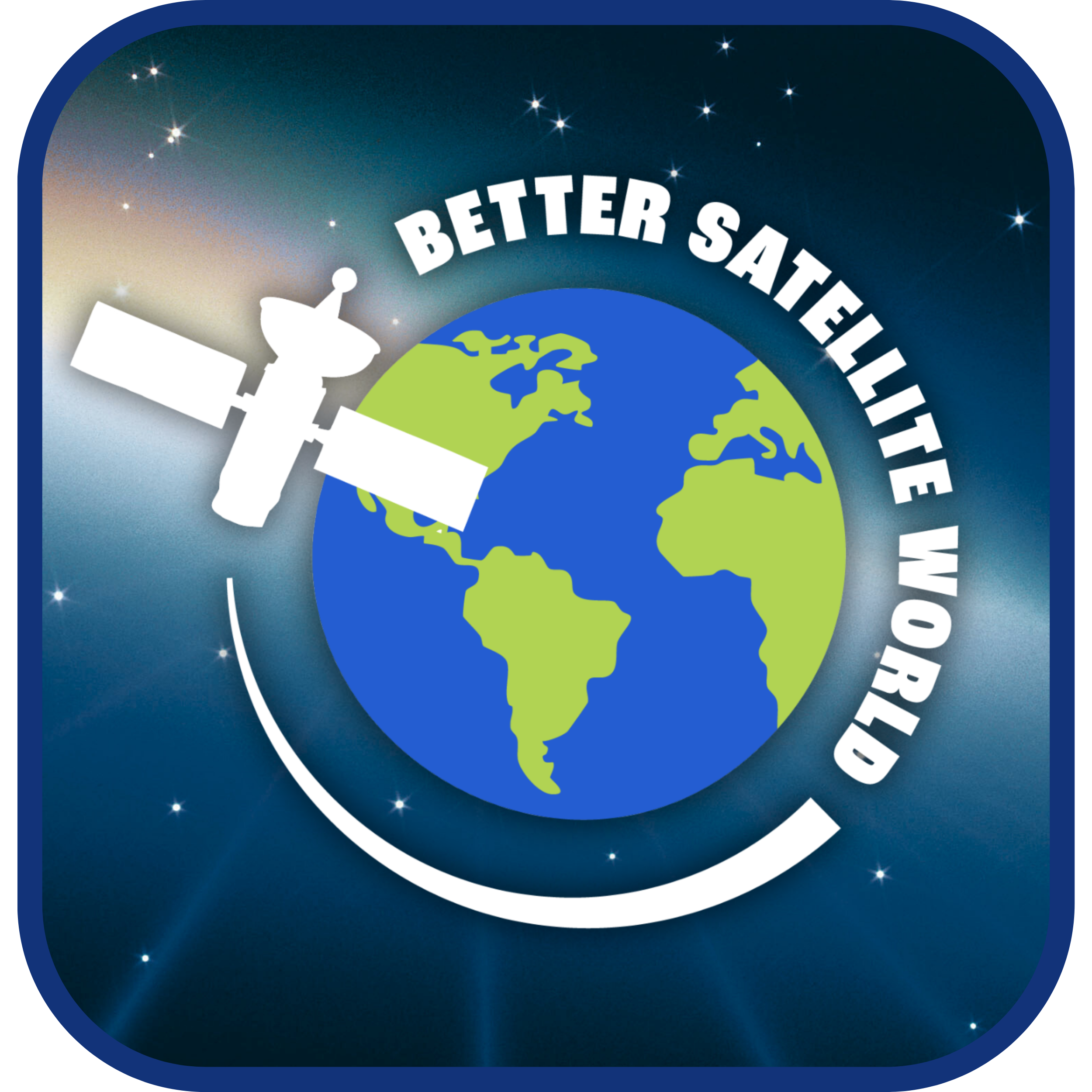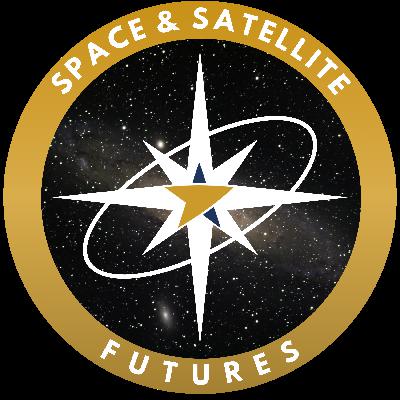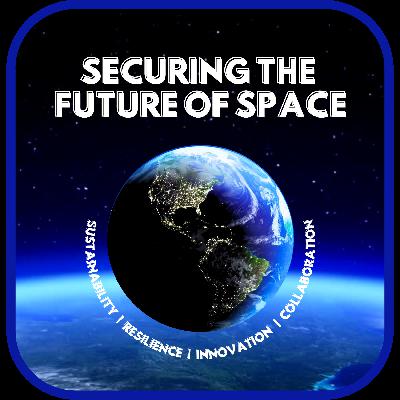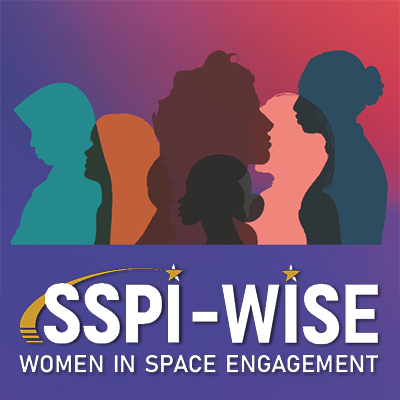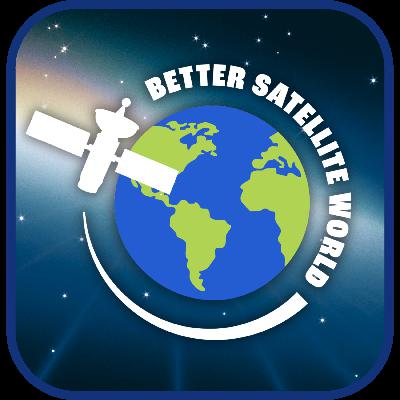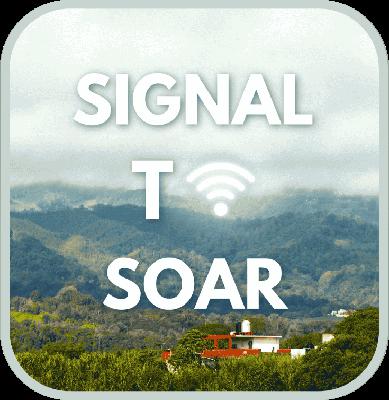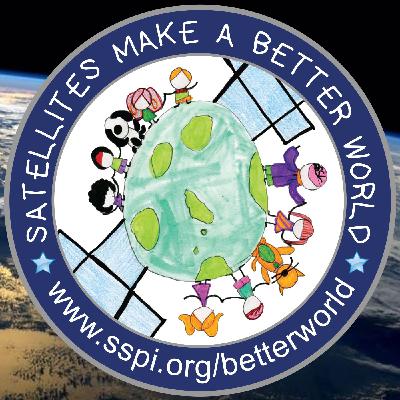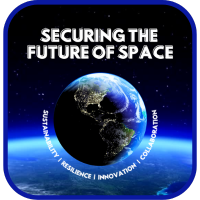Discover SSPI
SSPI

SSPI
Author: Space & Satellite Professionals International
Subscribed: 29Played: 787Subscribe
Share
Description
This is the official podcast of the Space & Satellite Professionals International. On this channel, we release podcasts in two series: Making Leaders and Better Satellite World.
Find out more about SSPI at www.sspi.org
Find out more about SSPI at www.sspi.org
332 Episodes
Reverse
This special mini-series, The People Behind the Progress, celebrates the finalists for the UK Space and Satellite Personality of the Year Award – A distinction that honors people whose ideas, integrity, and influence have advanced the UK's role on the global stage. In the first episode of this mini-series, we hear from Dr. Alice Bunn, President of UKspace. Dr Alice Bunn is a globally recognised leader in science and engineering, with a distinguished career spanning strategic leadership, international diplomacy, and public engagement. Awarded an OBE in the Queen's Honours List in 2022 for her services to the UK space sector, Alice is President of the UKspace Trade Association and has a 25-year career in the space sector where she has held leadership positions in national, European and global contexts. Alice sits on the Advisory Board of Strategy International and acts as strategic advisor to a number of companies spanning the UK and international space sectors. As former Chief Executive of the Institution of Mechanical Engineers, she led a global organisation of over 115,000 members, where she successfully reversed a 15-year financial decline and implemented a transformative strategy focused on societal impact. Previously, Alice served as International Director at the UK Space Agency, where she secured record investments in the European Space Agency and pioneered new approaches to civil space security and infrastructure. Alice is a passionate advocate for science communication and is a chartered engineer. Alice is regularly called upon as a media expert contributor to all things space and engineering, appearing on BBC, Radio 4, ITN, Sky News and in demand as a speaker at international summits and conferences such as Davos, UN Summits, TEDx and more. Alice has a PhD in Metallurgy from Darwin College, University of Cambridge, and is also a Fellow of the Institution of Mechanical Engineers and the Royal Aeronautical Society. As an avid wild swimmer, she proudly sits as the Chair of the Board at SwimTayka, a drowning prevention charity that teaches kids in developing countries to swim.
In this episode of She Reaches, host Tanveer Pujara speaks with Maureen Gannon, Co-Founder and Chief Revenue Officer of X-Bow Systems, a company redefining the rocket motor and launch vehicle market through advanced manufacturing and innovation. With over 30 years of experience across aerospace, defense, and commercial sectors, Maureen has built a remarkable career leading high-performing teams, securing hundreds of millions in startup funding, and winning major U.S. defense contracts. As one of the few women co-founders in the solid rocket motor industry, she's not only disrupting technology — she's reshaping how leadership looks in aerospace. Tune in to hear Maureen's entrepreneurial journey — from co-founding Galactic Unite and Firefly Space to scaling X-Bow Systems — and her insights on breaking barriers, building momentum, and fueling innovation in a high-stakes industry.
In the Movers in Our Orbit podcast series, we speak with friends of SSPI who recently made big executive moves. We'll find out what they're doing now and what they hope to achieve in their new roles in the industry. In a rebroadcast of the first episode of season 2, we hear from Kelsey Doerksen, GeoAI Postdoctoral Researcher at Arizona State University and 2021 Promise Award Recipient. Passionate to do impactful work for Earth, in space, Kelsey Doerksen is currently pursuing her PhD at the University of Oxford in the Autonomous Intelligent Machines and Systems Centre for Doctoral Training Program, in the Oxford Applied and Theoretical Machine Learning Group under supervision of Yarin Gal. She is focusing her research on the uses of AI and Machine Learning to enable science discovery and understanding of climate-focused applications (expected graduation, 2025). Kelsey is a Research Affiliate at the NASA Jet Propulsion Lab and a part of the Machine Learning and Instrument Autonomy group, working on the Scientific Understanding from Data Science Strategic Initiative. She is also a Data Scientist with the Climate and Data Environment Unit at UNICEF, building the data pipeline infrastructure and providing analysis necessary to create the UNICEF Children's Climate Risk Index.
In Everyday Guardians, the podcast series of the Securing the Future of Space campaign, we speak with people who are helping to build a more resilient, sustainable and secure orbital environment – whether through technology, policy or ethical leadership. Securing the Future of Space is underwritten by the American Space Exploration Fund. In the fifth episode, we hear from Moriba Jah, President and Co-founder of GaiaVerse. Moriba Jah is a world-leading space environmentalist, astrodynamicist, and social justice advocate, a MacArthur Fellow and Professor of Aerospace Engineering at the University of Texas at Austin, where he holds the Mrs. Pearlie Dashiell Henderson Centennial Fellowship. He directs the Jah Decision Intelligence Group at the Oden Institute for Computational Engineering and Sciences. He also serves as Chief Scientist at Privateer and Co-founder of Moriba Jah Universal.
From Classroom to Community – the official podcast of the Signal to Soar campaign, underwritten by Hughes, an Echostar company – shines a spotlight on the tremendous difference connectivity can make for schools, especially those isolated by terrain and other factors, and how connectivity via satellite transforms the communities that surround those schools. When a remote school connects for the first time, everything changes. Students gain access to global knowledge, and teachers tap into new tools. Families and communities begin to share in the benefits. In the third episode of our series, we hear more on this topic from Mónica Aguirre, Deputy CEO of Satellite Services at Stargroup México. Mónica holds a Bachelor's degree in Financial Management from Tecnológico de Monterrey. She spent five years working in the financial industry at Value Casa de Bolsa, Morgan Stanley Capital International, and BBVA Bancomer. In 2015, she joined the Stargroup team to lead the finance department and later took on the role of Deputy CEO, overseeing strategic projects and building partnerships with national and international providers to deliver satellite telecommunications services. These solutions are tailored for businesses and government programs aimed at narrowing the digital divide across the country.
In the sixth episode of She Reaches, host Tanveer Pujara speaks with Kirsten Bartok Touw, Co-Founder and Managing Partner of New Vista Capital, an early-stage venture firm investing in space, aerospace, and defense technology. With a career spanning investment banking, venture capital, entrepreneurship, and national security policy, Kirsten brings a uniquely holistic view of how capital and innovation intersect to shape the future of aerospace and defense. Before launching New Vista, she co-founded AirFinance, served as Vice President of Corporate Development and Strategy at Hawker Beechcraft, and was CFO and co-founder of XOJET, later acquired by VistaJet. Tune in as Kirsten shares her journey and how she's helping bridge Silicon Valley and national security to accelerate the technologies defining our next decade of flight, defense, and space exploration.
Satellite connectivity makes all the difference in education, and bridging the gap to deliver high-speed internet to schools in hard-to-reach places creates the opportunity for every student to soar. In this SSPI-WISE Presents podcast, based on the panel conducted at the September 25 meeting of SSPI-WISE, we hear a roundtable discussion from leaders of NIGCOMSAT who share insights on how they are advancing digital inclusion and transforming education through satellite broadband. This episode is moderated by Ruth Okoh, Founder/Managing Director of Spaceboss Aerospace Consulting Ltd., and features Engr. Florence Ibrahim, Satellite Control & Operations, NIGCOMSAT, Engr. Opeyemi Kareem – Product & Presales Engineer, NIGCOMSAT, and Ifeoma Maureen Nzekwe, Deputy General Manager & Program Coordinator, NIGCOMSAT. This roundtable conversation is part of the Signal to Soar campaign. Whether separated by distance, infrastructure, or inequality, too many students remain disconnected from the full promise of education. Satellite connectivity helps bridge that gap, delivering high-speed internet to schools in hard-to-reach places—and bringing the world to students who are otherwise far from opportunity. From live-streaming lessons and global classrooms to virtual museum tours and cultural exchanges, satellites expand access to knowledge and connection. With the right signal, every student can soar. Click here to learn more.
In SSPI's Accelerate Change podcast series, sponsored by SES, we explore how creative collaboration is transforming the pace of innovation across the space and satellite industry. SES is championing a new era - one where partnerships, agile technologies, and bold ideas are breaking old cycles and building a more connected future. Through conversations with leaders in cloud, telecommunications, sustainability, and space infrastructure, we dive into the stories shaping the next frontier of global connectivity. In the fifth and final episode, we hear from Nihar Shah, Chief Strategy Officer at SES, who joins SSPI's Tamara Bond-Williams to explore how SES is redefining the industry's long investment cycles. Nihar Shah is SES's Chief Strategy Officer, driving strategic clarity and unlocking long-term business value for the organization. Having joined SES in 2006, Nihar has held various progressive managements roles in Market Research & Analysis and Strategic Market Development. Nihar was also part of the SES team that evaluated the company's investment into O3b Networks, defining SES's successful diversification strategy to global network services. Prior to SES, he worked for several years in consulting for the commercial and government space sector, and has lived and worked in India, the US and the Netherlands. Nihar holds a BA in Economics, an MA in International Space & Technology Policy from George Washington University, and a Joint MBA from Georgetown & ESADE.
From Classroom to Community – the official podcast of the Signal to Soar campaign, underwritten by Hughes, an Echostar company – shines a spotlight on the tremendous difference connectivity can make for schools, especially those isolated by terrain and other factors, and how connectivity via satellite transforms the communities that surround those schools. When a remote school connects for the first time, everything changes. Students gain access to global knowledge, and teachers tap into new tools. Families and communities begin to share in the benefits. In the first episode of our series, we hear more on this topic from Germán Otálora, Director of Microsoft's Airband Program for Latin America. Germán Otálora is the Director of Microsoft's Airband Program for Latin America, a role in which he dedicates most of his time to building partnerships between the public and private sectors, NGOs, and academia to bring purposeful connectivity to underserved rural communities across the region. He joined Microsoft in 2015 after a successful career in consulting, working for multinational firms such as PwC, where he led a team of over 30 consultants. As an avid traveler, Germán is well-acquainted with the economic and social realities of rural Latin America and has received several awards and recognitions for his hard work and dedication to connecting the unconnected. Germán holds a degree in Industrial Design (2001) and an MBA (2015) from Universidad de Los Andes. He currently lives in Bogotá, Colombia, with his wife, two children, and their Boston Terrier named Lupita.
In SSPI's Accelerate Change podcast series, sponsored by SES, we explore how creative collaboration is transforming the pace of innovation across the space and satellite industry. SES is championing a new era - one where partnerships, agile technologies, and bold ideas are breaking old cycles and building a more connected future. Through conversations with leaders in cloud, telecommunications, sustainability, and space infrastructure, we dive into the stories shaping the next frontier of global connectivity. In the fourth episode, we hear from Tina Ghataore, Group Chief Strategy and Revenue Officer and CEO of Aerospacelab North America. Tina gives us a look at how Aerospacelab is rewriting the satellite manufacturing playbook. By combining vertical integration with agile manufacturing, Aerospacelab is helping nations and companies achieve sovereign space capability - faster, simpler, and at greater scale - through collaboration. Tina Ghataore joined Aerospacelab in August 2023 as Group Chief Strategy and Revenue Officer, and CEO of Aerospacelab's new North American branch. Prior to joining the fast-growing international startup specialized in designing, manufacturing and operating small satellites, Tina served as Chief Commercial Officer of Mynaric and President of Mynaric USA where she led the company's efforts to position Mynaric as the preferred laser communication provider for aerospace application for both government and commercial markets. In 2022, Tina's contribution to the aerospace industry was recognized by both the public and industry peers alike when she was voted Via Satellite's "Satellite Executive of the Year", accepting her award in front of a select audience at the industry's leading annual conference 'Satellite 2022.' Before Mynaric, she was the Executive Vice President of Inflight Connectivity Solutions at Yahsat, a leading UAE Satellite Operator, where she was responsible for the overall strategy and execution of enabling the organization to launch into the Mobility Satcom Services business.
In this episode of She Reaches, host Tanveer Pujara sits down with Laura Crabtree — aerospace engineer, CEO and co-founder of Epsilon3, and one of the Crew Operations & Resource Engineers (CORE) who helped put the United States back in the human spaceflight business. Before launching Epsilon3 in 2021, Laura spent more than a decade at SpaceX, where she trained astronauts, authored and executed hundreds of procedures, and sat on console for milestone Dragon missions — including the first flight to the ISS and the first commercial crew launch in 2020. Epsilon3, often described as the "operating system for space missions," was born from Laura's first-hand experience with checklists, spreadsheets, and tools that couldn't keep pace with the complexity of modern space operations. Today, the platform is streamlining workflows not only for spacecraft but also for aviation and other industries with complex technical missions. Tune in to hear Laura's founder journey and why she's passionate about building better tools, mentoring the next generation of women in STEM, and chasing big challenges both in and out of this world.
In SSPI's Accelerate Change podcast series, sponsored by SES, we explore how creative collaboration is transforming the pace of innovation across the space and satellite industry. SES is championing a new era - one where partnerships, agile technologies, and bold ideas are breaking old cycles and building a more connected future. Through conversations with leaders in cloud, telecommunications, sustainability, and space infrastructure, we dive into the stories shaping the next frontier of global connectivity. In the third episode, we hear from Kidsan Barnes, Senior Vice President of Cruise & Ferry at Quvia. Kidsan Barnes is a distinguished leader in the satellite communications and cruise connectivity industries. She currently serves as the Senior Vice President of Cruise & Ferry at Quvia. With a career marked by innovation and strategic vision, Kidsan has played a pivotal role in driving growth and transformation within her sector. Kidsan's leadership philosophy centers on strategic intent, mental clarity, and the joy of leading. Her contributions have not gone unnoticed; she was honored on the South Florida Business Journal's "40 Under 40" list, recognizing her significant impact on her industry, the economy and community, and also recognized on their Influential Business Women's list for 2022. Under her leadership, Quvia's Cruise & Ferry division has seen remarkable advancements, solidifying its position as a leader in the fast-evolving world of satellite communications. Kidsan's dedication to excellence and philanthropic contributions are seen in her voluntary board roles for both SSPI and Florida International University where she gained her Executive MBA. She remains an inspiration for those in the industries she serves.
In SSPI's Accelerate Change podcast series, sponsored by SES, we explore how creative collaboration is transforming the pace of innovation across the space and satellite industry. SES is championing a new era - one where partnerships, agile technologies, and bold ideas are breaking old cycles and building a more connected future. Through conversations with leaders in cloud, telecommunications, sustainability, and space infrastructure, we dive into the stories shaping the next frontier of global connectivity. In the second episode, we hear from three major players at Amazon Web Services: Shayn Hawthorne, General Manager of Space Services, Akanksha Alok, Solutions Architect - Artificial Intelligence and Machine Learning, and Jonathon Fraker, Senior Account Executive, USSF. Shayn Hawthorne has worked for over 30 years in the space field, first as an Active Duty and Reserve US Air Force astronautical engineer and space operations officer, building and launching research and development satellites for the Intelligence Community (IC) and conducting both space surveillance and counterspace operations. Shayn also served 20 years at the MITRE Corporation as Technical Director on IC sensors, Missile Defense Agency sensors and engagement systems, and Space Control Operations. Shayn then joined Amazon Web Services where he founded AWS Ground Station, Amazon's 1st space service, helped start AWS's Aerospace & Satellite Solutions Division, and developed on-orbit space edge runtimes. Shayn is now AWS's Principal Advisor for National Security sensors and satellites. In this role Shayn works with customers and builders across AWS to build new enterprises that utilize AWS services and features to disrupt how space operations are conducted. Akanksha Alok is an Artificial Intelligence and Machine Learning professional with a background in computer science from the University of Virginia and an MBA from Johns Hopkins. With over five years at Amazon Web Services, she has held impactful roles-first as a Data Scientist, where she built end-to-end machine learning pipelines, and currently as a Solutions Architect, helping organizations design and scale "intelligent" systems both on the ground and in space. Her expertise spans natural language processing, computer vision, and generative Al, with deep focus areas including agentic workflows, retrieval-augmented generation (RAG), context engineering, and large-scale model training and inference. Akanksha is passionate about translating cutting-edge research into practical solutions that drive real-world value. Jonathon Fraker is a Space Technology and National Security professional specializing in cloud-enabled space operations. At Amazon Web Services, he partners with the U.S. Space Force to implement mission-critical cloud solutions that enhance space operations capabilities. He has also developed new AWS space-edge services, delivering innovative solutions for both government and commercial missions. His expertise spans space mission management, ground systems architecture, and cloud technology integration for space and defense applications. During his tenure at Raytheon Technologies, he led FVEY space programs that pioneered cloud-based Mission Management systems. Jonathon focuses on advancing national space capabilities through commercial innovation, dedicating his career to empowering space and national security partners with transformative technologies.
In Everyday Guardians, the podcast series of the Securing the Future of Space campaign, we speak with the people who are helping to build a more resilient, sustainable and secure orbital environment - whether through technology, policy or ethical leadership. Securing the Future of Space is underwritten by the American Space Exploration Fund. In the fourth episode, we hear from Marshall Smith, President of Space Solutions at Voyager Technologies. Marshall Smith has decades of experience designing and building complex, human-rated space systems for NASA. He serves as the President of Space Solutions at Voyager, overseeing the business segment. Previously as Voyager's Chief Technology Officer, Mr. Smith lead the technical strategy for the enterprise. He continues to guide the Starlab team through the design, development, and operations of the commercial space station through his role as a Board Member. Prior to CTO, Mr. Smith served as Voyager's Vice President of Exploration. Previously at Nanoracks, since acquired by Voyager Technologies, Mr. Smith managed the space systems division, which included commercial space station development, autonomous outpost platforms, and support systems including airlocks. Marshall comes to Voyager having served for 37 years at NASA, most recently as the Deputy Associate Administrator for Systems Engineering, Director for Human Exploration and Director for Cross-Program Systems Engineering. Smith led several initiatives that integrated innovative commercial partnerships into NASA's deep-space exploration programs, including the Human Landing System and more. He is the recipient of the NASA Systems Engineering Excellence of the Year Award, the NASA Outstanding Leadership Medal, and the NASA Exceptional Service Medal.
In this episode of She Reaches, host Tanveer Pujara sits down with Tess Hatch — aerospace engineer, Managing Director at Stifel Venture Bank, and one of today's most influential voices in space investing. Tess has built her career at the intersection of science and business, with experience at Boeing, SpaceX, and Bessemer Venture Partners before joining Stifel. Today, she champions visionary entrepreneurs who are transforming science fiction into reality — from satellite constellations to commercial spaceflight and the deep tech driving the future of our world and beyond. Tune in to hear Tess's unique journey from the engineering floor to the front lines of venture capital, why she's betting big on space as the next great frontier, and how she's working to shape the ecosystem for the next generation of innovation. Tess Hatch (left) and Tanveer Pujara (right)
In this podcast series, we speak with friends of SSPI who recently made big executive moves. We'll find out what they're doing now and what they hope to achieve in their new roles in the industry. In this episode, we meet someone navigating the personal side of one of the biggest transformations our industry has ever seen. Sylvie Macraigne is a product and strategy leader with more than 20 years of international experience – from France to London to the U.S. to Luxembourg. Her resume includes Orange, Globecast, Arqiva, and Intelsat. Now she serves as Senior Principal Product Manager at SES, where she's helping lead the company's multi-orbit future – including integrating Low Earth Orbit capabilities into SES's service portfolio. Sylvie joins us just days after SES acquired Intelsat – a historic merger that will shape this industry for decades to come. What does that kind of change feel like on the inside? How do you hold steady in the midst of it? And where does the future lead from here?
In SSPI's new Accelerate Change podcast series, sponsored by SES, we explore how creative collaboration is transforming the pace of innovation across the space and satellite industry. SES is championing a new era - one where partnerships, agile technologies, and bold ideas are breaking old cycles and building a more connected future. Through conversations with leaders in cloud, telecommunications, sustainability, and space infrastructure, we dive into the stories shaping the next frontier of global connectivity. What if your phone could connect to space? Not with a bulky terminal, but with the device already in your hand, wherever you are, no matter the infrastructure on the ground? In this first episode of the series, we hear from Amy Mehlman, Executive Vice President and Chief Global Affairs Officer at Lynk Global. Amy has shaped telecom and space policy for nearly thirty years - from Congress to the FCC, from multinationals to NewSpace startups. Today, she's helping guide a company that's redefining who can connect and how, through a new model of global access. In this episode, Amy and SSPI's Tamara Bond-Williams explore how unmodified mobile phones can connect directly to satellites: no towers or special hardware needed. Amy Mehlman is EVP and Chief Global Affairs officer at Lynk Global. She is a senior telecommunication professional with nearly three decades hands-on experience helping innovative companies secure favorable public policies, government contracts and secure market access by working with government representatives, industry partners, and multilateral NGOs. Most recently, Mehlman worked as VP for Global Affairs and Stakeholder Relations at E-Space Inc. where she led global policy efforts shaping the rapidly growing non-geostationary satellite market, successfully-pursued government contracts, obtained market access, spearheaded partnerships, and oversaw legislative efforts. Prior to that Amy served as VP of U.S. Government Affairs and Global Policy at Viasat, leading their domestic and international policy efforts on satellite licensing, space safety and equitable access to spectrum. Earlier in her career, Amy was Founder and President of a successful boutique telecommunications public policy firm (Mehlman Capitol Strategies) representing over 30 companies before the U.S. Congress, FCC & Executive Branch. Amy began her career at the prestigious Washington, D.C. law firm Wiley, Rein & Fielding where she represented leading wireless, satellite, telecom equipment and broadcast companies before the US Congress and Administration.
In Everyday Guardians, the podcast series of the Securing the Future of Space campaign, we speak with the people who are helping to build a more resilient, sustainable and secure orbital environment - whether through technology, policy or ethical leadership. Securing the Future of Space is underwritten by the American Space Exploration Fund. In the third episode, we hear from Nobu Okada, Founder & CEO of Astroscale. Since establishing Astroscale in 2013, Nobu Okada has grown the company from a one-person venture into a global organization with offices in five countries and led the company to a successful IPO in 2024. A highly respected figure in the space industry, Nobu is an Honorary Ambassador of the International Astronautical Federation (IAF), a member of the International Academy of Astronautics, an advisory board member of the Space Generation Advisory Council, and a Fellow of the Royal Aeronautical Society. He plays an active role in United Nations forums, contributing to key workshops and committee discussions that shape the global agenda for space sustainability. Nobu previously served as the IAF's Vice President for Space Economy and Sponsorship and co-chaired the World Economic Forum's Global Future Council on Space Technologies until 2021. Under Nobu's leadership, Astroscale has received numerous accolades, including the IAF Excellence in Industry (SME) in 2023, the Japanese Prime Minister's Award in 2022, and recognition as one of TIME100's Most Influential Companies in 2022. Nobu has also received individual recognition, including the 2020 SpaceNews Company Leader of the Year and the 2019 Forbes JAPAN Start-up of The Year. Before founding Astroscale, Nobu was an IT entrepreneur and strategy consultant, managing IT companies across the Asia-Pacific region. He successfully led one company to an IPO. Earlier in his career, he worked at McKinsey & Company and served in the Japanese Ministry of Finance. Nobu holds a bachelor's degree in Agriculture from the University of Tokyo and an MBA from the Krannert School of Business, Purdue University.
In this episode of She Reaches, host Tanveer Pujara speaks with Sarah "Sassie" Duggleby, CEO and Co-Founder of Venus Aerospace – a Houston-based startup developing hypersonic spaceplanes that could enable one-hour global travel. With a background in aerospace engineering and a bold vision for the future of high-speed transportation, Sassie is pioneering technology that could transform how we connect across the planet. As a first-time founder, engineer, and inspiring leader, Sassie shares insights from her journey, the challenges of building something truly groundbreaking, and her passion for making space and advanced transportation more accessible. Sassie Duggleby (left) and Tanveer Pujara (right) Whether you're an aspiring entrepreneur, a space enthusiast, or curious about the innovators shaping the future, Sassie's story offers inspiration, real-world lessons, and a glimpse into the future of spaceflight.
In the second season of The Road Less Traveled series, SSPI's Tamara Bond-Williams speaks with people whose lives and work inspire us because they walk "the road less traveled," the one leading us to a wider view of space, satellites and our quest for the dwelling of light we call "The Truth." This episode features a roundtable conversation with Chris Impey, Distinguished Professor of Astronomy at the University of Arizona; Dr. Claire Nelson, Chief Ideation Leader of The Futures Forum; and Frank White, Professor at Kepler Space University and author of The Overview Effect: Space Exploration and Human Evolution. Chris Impey is a University Distinguished Professor of Astronomy at the University of Arizona. He has over 450 publications on education, observational cosmology, galaxies, and quasars, and his research has been supported by $20 million in NASA and NSF grants. He has won eleven teaching awards and has taught four online classes with over 420,000 enrolled and 8 million minutes of video lectures watched. Chris Impey is a past Vice President of the American Astronomical Society, and he has won its career Education Prize. He's also been NSF Distinguished Teaching Scholar, Carnegie Council's Arizona Professor of the Year, and a Howard Hughes Medical Institute Professor. He has written 120 popular articles on cosmology, astrobiology and education, two textbooks, a novel called Shadow World, and ten popular science trade books: The Living Cosmos, How It Ends, Talking About Life, How It Began, Dreams of Other Worlds, Humble Before the Void, Beyond: The Future of Space Travel, Einstein's Monsters: The Life and Times of Black Holes, Worlds Without End: Exoplanets, Habitability and the Future of Humanity, and most recently Recipe for a Universe: Cosmic Chemistry from the Big Bang to You. Dr. Claire Nelson, Chief Visionary Officer of The Futures Forum, is listed among Forbes Top 50 Female Futurists. The author of the game-changing book SMART Futures for a Flourishing World: A Paradigm Shift for Achieving Global Sustainability, is a Board Member of the World Futures Studies Federation and Editor of its flagship magazine Human Futures. The Convenor of Space Futures Forum is noteworthy for her advocacy for global and space sustainability and serves as Advisor to various groups including Engineering for One Planet and Space for Humanity. A social entrepreneur, Nelson is Founding Convenor of June as National Caribbean American Heritage Month. A dynamic keynote speaker and storyteller, her one-woman show 'Moon Runnings: The Life & Times of the First Jamaican on the Moon' is aimed at advancing planetary consciousness. Honored as a White House Champion of Change, she holds a Doctorate in Engineering Management from George Washington University. Frank White is a magna cum laude graduate of Harvard College, a member of Phi Beta Kappa, and a Rhodes Scholar. He earned an M.Phil. in Politics from Oxford University. White's book, The Overview Effect: Space Exploration and Human Evolution, is considered by many to be a seminal work in the field of space studies. He has authored or co-authored numerous additional books on a wide range of topics, including SETI, AI, and climate change. In addition to his writing career, White is co-executive editor of Sentient Media, LLC, President and Board Chair of the Human Space Program, a Professor at Kepler Space University, and a Curator of Space and AI information for Intro-act.


